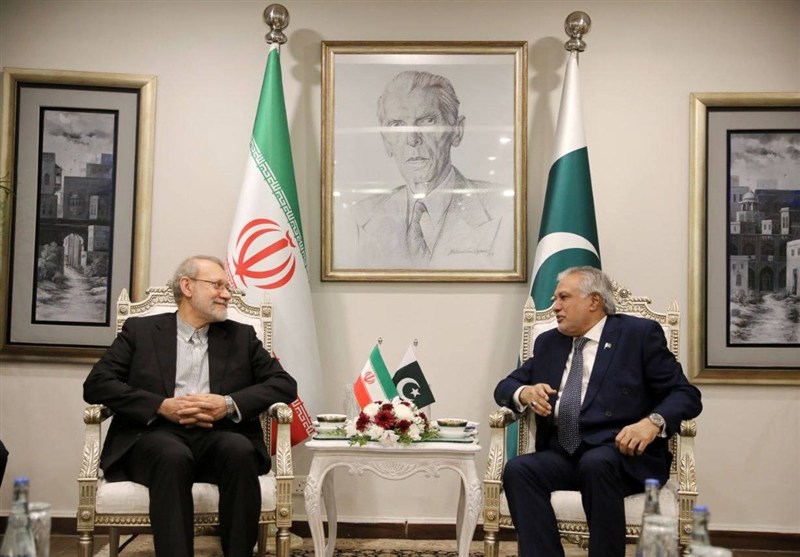Alwaght- Yesterday, Islamabad had a special guest: Secretary-General of Iran's Supreme National Security Council, Ali Larijani. Larijani and his delegation were received by Foreign Minister Mohammed Ishaq Dar. The first meeting was also held with the FM. In his opening comments, Ishaq Dar congratulated Larijani for his new post, highlighting the significance of "brotherly" relations between Iran and Pakistan.
The last visit to Pakistan of Larijani was eight years ago, when he was the parliament speaker and attended the conference of parliament speakers of 6 countries. In this visit, many of the observers pay attention to security and political aspects.
Security and political bond of Tehran-Islamabad
Iran and Pakistan are strengthening their political alignment. Islamabad's recent condemnation of the Israeli regime's 12-day aggression against Iran serves as a clear marker of this growing closeness.
The speaker of Pakistan's National Assembly described the condemnation as "reflecting the deep bond between the two nations."
Prior to his visit to Islamabad, the Secretary of Iran's Supreme National Security Council underscored this historical solidarity on X, stating, "The Iranian people have not forgotten that the Pakistani nation stood with Iran during the war waged by the Israeli regime and the US."
The Pakistani side is equally committed to enhancing security and political relations. In a meeting with the Iranian official, Prime Minister Shehbaz Sharif reaffirmed Islamabad's commitment to "close and continuous cooperation" with Tehran. In an official statement, Sharif's office noted that he appreciated Iran's "principled positions on regional issues" and called for a deepening of the "historical and brotherly relations" between the two countries across various fields.
Tripartite Tehran-Islamabad-Riyadh coalition
Recently, an important defense pact was signed between Pakistan and Saudi Arabia that received Iranian welcome. In his meetings with Pakistan officials, Larijani said that an Iranian-Pakistani-Saudi defense pact can play an "important role in regional security." upon his arrival, the senior Iranian diplomat in his comments to press underscored Pakistan's position in the region saying that Tehran-Islamabad cooperation will contribute to regional peace.
Lebanon's Al Mayadeen news network reported that the visit by Iran's Larijani to Islamabad primarily aims not for a ceremonial meeting, but to pave the way for a strategic coalition between Iran and Pakistan, which would later be expanded to include Saudi Arabia.
It is also noteworthy that Larijani's visit to Islamabad coincided with the presence of a separate, high-level Saudi military delegation in the Pakistani capital. This timing has intensified speculation about a potential trilateral coalition between Tehran, Riyadh, and Islamabad.
Pakistani-Iranian mutual need
The reality is that Pakistan is currently grappling with intense rivalry with India and ongoing tensions with the Taliban in Afghanistan. In this context, forging regional alliances and linking them to larger coalitions appears to be part of Pakistan's strategy to overcome its regional challenges. Iran, a powerful military neighbor and a Chinese ally, could be key to tipping the regional balance in Pakistan's favor against India.
Simultaneously, for Iran, securing Pakistan's cooperation in combating terrorist groups along their shared border is a significant and urgent priority. As Tehran contends with the threat from the Israeli regime, it is crucial for it to have greater confidence in its eastern borders and to monitor armed terrorist factions along the frontier with Pakistan. Therefore, a key objective of the senior Iranian official's visit is assessed to be framing cooperation for joint action against these terrorist groups operating in the border regions.
Common enemy
Indeed, what makes the Iranian-Pakistan coalition stronger is the existence of a shared enemy: Israeli regime. Both Pakistan and Iran in spring and summer of this year had multi-day wars and both of them emerged victorious. The interesting point about these wars was that both of these countries saw Tel Aviv as their common enemy. During the recent spring war in Kashmir, in which India confronted Pakistan, the Israeli regime emerged as a key supporter and ally of New Delhi. It actively sought to secure a military victory for Prime Minister Modi, whose government has grown increasingly close to Tel Aviv in recent years. Furthermore, just weeks after India's offensive against Pakistan, the Israeli forces launched an aggression on Iran. However, in this subsequent conflict, they again failed to achieve their stated objective of overthrowing the Islamic Republic.
So, in a common security climate in the region, both the Iranian and Pakistani sides need convergence as they know they have the Israeli regime as their common enemy and the best option to counter this enemy is a coalition against the enemies of Tehran and Islamabad as the two big and important countries in the Muslim world.



























